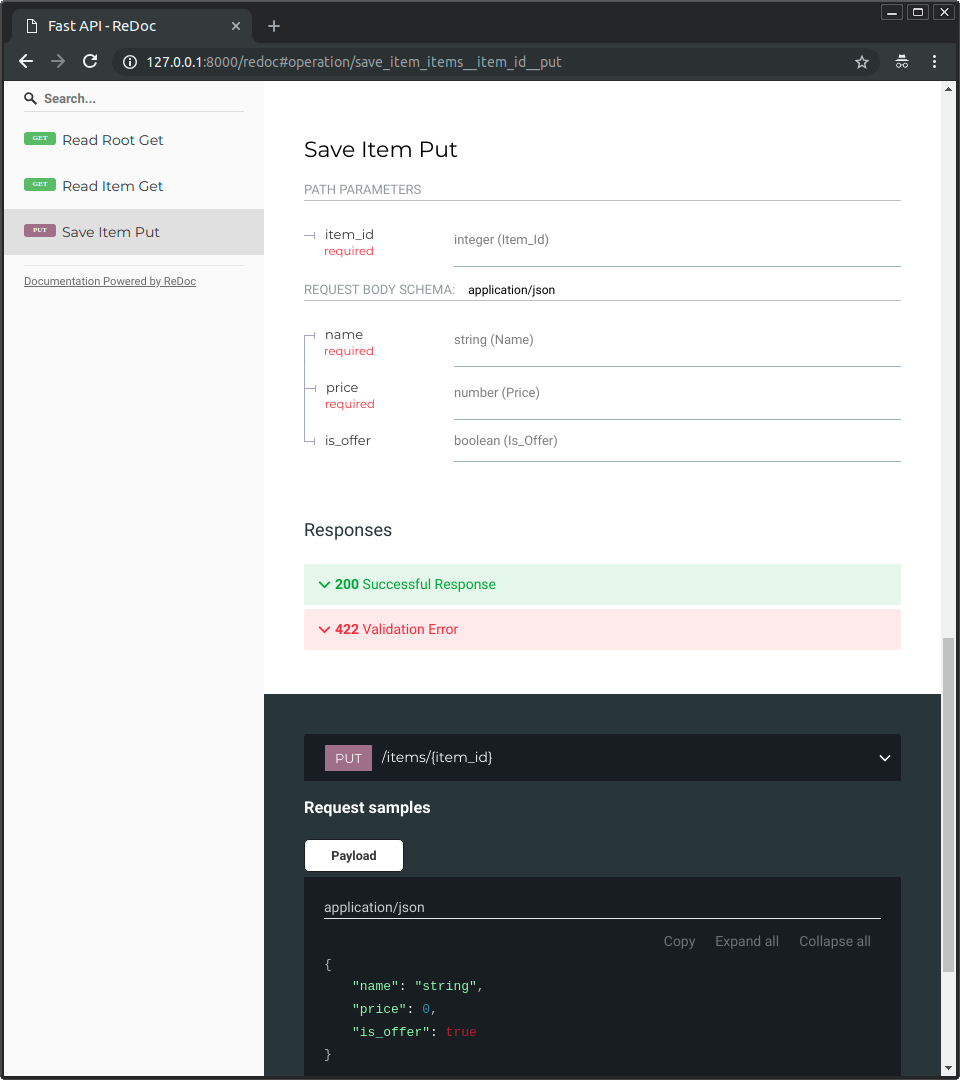- Sort Score
- Num 10 results
- Language All
Results 51 - 60 of 1,613 for _parameters (0.88 seconds)
-
docs/en/docs/tutorial/request-files.md
/// /// tip To declare File bodies, you need to use `File`, because otherwise the parameters would be interpreted as query parameters or body (JSON) parameters. /// The files will be uploaded as "form data". If you declare the type of your *path operation function* parameter as `bytes`, **FastAPI** will read the file for you and you will receive the contents as `bytes`.
Created: Sun Dec 28 07:19:09 GMT 2025 - Last Modified: Sun Aug 31 09:15:41 GMT 2025 - 7.3K bytes - Click Count (0) -
fastapi/param_functions.py
Created: Sun Dec 28 07:19:09 GMT 2025 - Last Modified: Sat Dec 27 12:54:56 GMT 2025 - 63K bytes - Click Count (0) -
compat/maven-plugin-api/src/test/resources/plugin.xml
<configurator>antrun</configurator> <parameters> <parameter> <name>finalName</name> <alias>jarName</alias> <type>java.lang.String</type> <implementation>java.lang.String</implementation> <required>false</required> <editable>true</editable> <description>parameter-description</description>
Created: Sun Dec 28 03:35:09 GMT 2025 - Last Modified: Fri Oct 25 12:31:46 GMT 2024 - 3.3K bytes - Click Count (0) -
fess-crawler/src/main/java/org/codelibs/fess/crawler/client/http/form/FormScheme.java
throw new IORuntimeException(e); } } /** * Parses request parameters from a string. * @param params The parameter string. * @param paramList Additional parameters. * @param encoding The encoding. * @return The HttpEntity containing the parsed parameters. */
Created: Sat Dec 20 11:21:39 GMT 2025 - Last Modified: Sun Jul 06 02:13:03 GMT 2025 - 14.3K bytes - Click Count (1) -
compat/maven-plugin-api/src/main/java/org/apache/maven/plugin/descriptor/PluginDescriptorBuilder.java
// Parameters // ---------------------------------------------------------------------- PlexusConfiguration[] parameterConfigurations = c.getChild("parameters").getChildren("parameter"); List<Parameter> parameters = new ArrayList<>(); for (PlexusConfiguration d : parameterConfigurations) { Parameter parameter = new Parameter();Created: Sun Dec 28 03:35:09 GMT 2025 - Last Modified: Tue Mar 25 09:45:07 GMT 2025 - 17.5K bytes - Click Count (0) -
src/main/java/org/codelibs/fess/app/pager/DuplicateHostPager.java
public String createdBy; /** Search/filter parameter for duplicate host creation time. */ public String createdTime; /** Search/filter parameter for duplicate host version number. */ public String versionNo; /** * Creates a new DuplicateHostPager with default values. * Initializes pagination settings and clears all search parameters. */Created: Sat Dec 20 09:19:18 GMT 2025 - Last Modified: Thu Jul 17 08:28:31 GMT 2025 - 7.5K bytes - Click Count (0) -
impl/maven-core/src/main/java/org/apache/maven/lifecycle/internal/DefaultMojoExecutionConfigurator.java
} private Stream<String> getParameterNames(Parameter parameter) { if (parameter.getAlias() != null) { return Stream.of(parameter.getName(), parameter.getAlias()); } else { return Stream.of(parameter.getName()); } } private Set<String> getUnknownParameters(MojoExecution mojoExecution, Set<String> parameters) {Created: Sun Dec 28 03:35:09 GMT 2025 - Last Modified: Tue Mar 25 09:45:07 GMT 2025 - 7.3K bytes - Click Count (0) -
docs/en/docs/tutorial/path-operation-configuration.md
# Path Operation Configuration { #path-operation-configuration } There are several parameters that you can pass to your *path operation decorator* to configure it. /// warning Notice that these parameters are passed directly to the *path operation decorator*, not to your *path operation function*. /// ## Response Status Code { #response-status-code } You can define the (HTTP) `status_code` to be used in the response of your *path operation*.Created: Sun Dec 28 07:19:09 GMT 2025 - Last Modified: Wed Dec 17 20:41:43 GMT 2025 - 4.1K bytes - Click Count (0) -
fastapi/openapi/utils.py
if openapi_examples: parameter["examples"] = jsonable_encoder(openapi_examples) elif example != Undefined: parameter["example"] = jsonable_encoder(example) if getattr(field_info, "deprecated", None): parameter["deprecated"] = True parameters.append(parameter) return parameters def get_openapi_operation_request_body( *,Created: Sun Dec 28 07:19:09 GMT 2025 - Last Modified: Sat Dec 27 12:54:56 GMT 2025 - 23.2K bytes - Click Count (0) -
README.md
* The alternative documentation will also reflect the new query parameter and body:  ### Recap In summary, you declare **once** the types of parameters, body, etc. as function parameters. You do that with standard modern Python types.
Created: Sun Dec 28 07:19:09 GMT 2025 - Last Modified: Thu Dec 25 11:01:37 GMT 2025 - 26.4K bytes - Click Count (0)